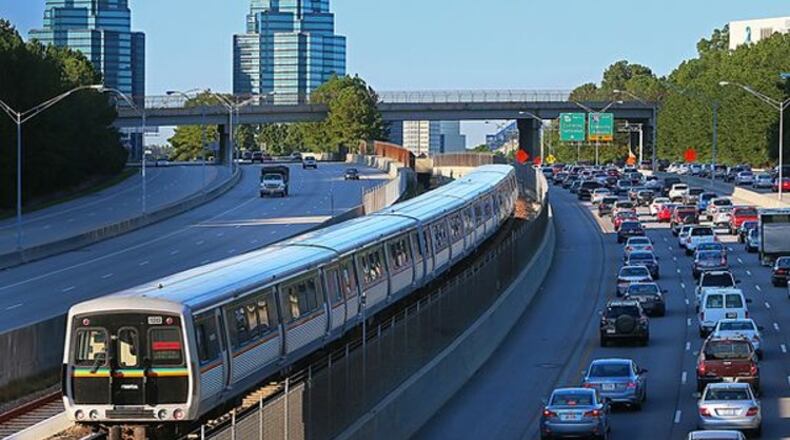Elected officials in Georgia are inching closer to specific proposals to boost funding for public transportation in metro Atlanta.
For months, the House Commission on Transit Funding and Governance has discussed options ranging from state funding for capital projects to new local taxing districts to pay for transit expansions. One potential change would allow local governments to collect special sales taxes for at least 20 years, instead of the current five — a provision that could clear the way for suburban transit votes next year.
Lawmakers were mum on details Wednesday at a commission meeting in Savannah. But recommendations could come in the next few weeks, before the General Assembly convenes in January.
Chairman Kevin Tanner, R-Dawsonville, said he’d like to see the General Assembly address transit in the Atlanta region because of its urgent traffic problems before moving on to other parts of the state.
The House commission's work is just the latest sign that mass transit has gained new momentum, especially in suburban Atlanta communities that have traditionally resisted public transportation.
The renewed interest is driven, in part, by economic development concerns. Companies like State Farm and Mercedes-Benz are building along MARTA lines, and Amazon has made clear that any community hoping to land its new corporate headquarters must have access to mass transit.
Officials in Fulton and Gwinnett counties are preparing transit expansion plans they may present to voters next year. Cobb County also is developing transit plans that could lead to a vote.
Georgia spends about $14.5 million annually on transit – much of it for Xpress bus service in the metro Atlanta – and ranks 27th among the 50 states in spending on public transportation.
Among the ideas to boost state funding that the commission has discussed:
- Providing regular funding for capital expenses, but not transit operations. Though Georgia already operates commuter buses in the Atlanta area, Tanner has said the state is not interested in getting deeper into the business of operating transit services.
- Amending Georgia law to allow special districts – that perhaps cross county lines – to approve sales taxes to support transit. That would allow communities that want transit to pay for it without obligating parts of a county that are not interested.
- Changing state law to extend the life of transportation special purpose local option sales taxes (T-SPLOSTs) to at least 20 years. Currently, such taxes can last for only five years. But to qualify for federal funding, local transit projects must have at least 20 years of funding available.
Tanner’s push to address such issues in Atlanta first is just the beginning of the commission’s work. It may spend much of the next year addressing funding and other issues in other urban and rural areas of the state.
MYAJC.COM: REAL JOURNALISM. REAL LOCAL IMPACT.
The AJC's David Wickert keeps you updated on the latest in what's happening with transportation in metro Atlanta and Georgia. You'll find more on myAJC.com, including these stories:
Never miss a minute of what's happening in Atlanta transportation news. Subscribe to myAJC.com.
About the Author
Keep Reading
The Latest
Featured




